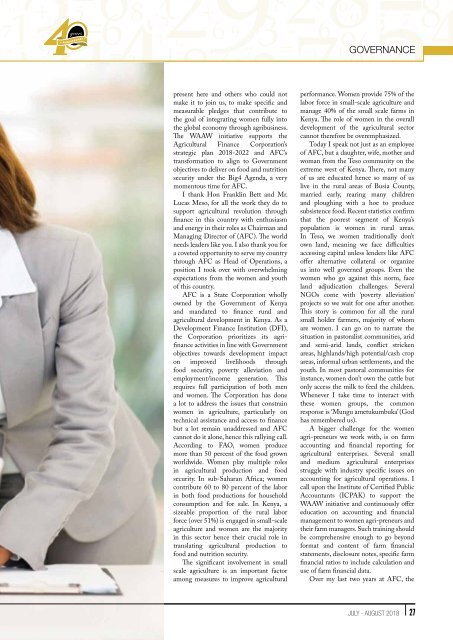The-Accountant-July-Aug-2018
Create successful ePaper yourself
Turn your PDF publications into a flip-book with our unique Google optimized e-Paper software.
Governance<br />
present here and others who could not<br />
make it to join us, to make specific and<br />
measurable pledges that contribute to<br />
the goal of integrating women fully into<br />
the global economy through agribusiness.<br />
<strong>The</strong> WAAW initiative supports the<br />
Agricultural Finance Corporation’s<br />
strategic plan <strong>2018</strong>-2022 and AFC’s<br />
transformation to align to Government<br />
objectives to deliver on food and nutrition<br />
security under the Big4 Agenda, a very<br />
momentous time for AFC.<br />
I thank Hon Franklin Bett and Mr.<br />
Lucas Meso, for all the work they do to<br />
support agricultural revolution through<br />
finance in this country with enthusiasm<br />
and energy in their roles as Chairman and<br />
Managing Director of (AFC). <strong>The</strong> world<br />
needs leaders like you. I also thank you for<br />
a coveted opportunity to serve my country<br />
through AFC as Head of Operations, a<br />
position I took over with overwhelming<br />
expectations from the women and youth<br />
of this country.<br />
AFC is a State Corporation wholly<br />
owned by the Government of Kenya<br />
and mandated to finance rural and<br />
agricultural development in Kenya. As a<br />
Development Finance Institution (DFI),<br />
the Corporation prioritizes its agrifinance<br />
activities in line with Government<br />
objectives towards development impact<br />
on improved livelihoods through<br />
food security, poverty alleviation and<br />
employment/income generation. This<br />
requires full participation of both men<br />
and women. <strong>The</strong> Corporation has done<br />
a lot to address the issues that constrain<br />
women in agriculture, particularly on<br />
technical assistance and access to finance<br />
but a lot remain unaddressed and AFC<br />
cannot do it alone, hence this rallying call.<br />
According to FAO, women produce<br />
more than 50 percent of the food grown<br />
worldwide. Women play multiple roles<br />
in agricultural production and food<br />
security. In sub-Saharan Africa; women<br />
contribute 60 to 80 percent of the labor<br />
in both food productions for household<br />
consumption and for sale. In Kenya, a<br />
sizeable proportion of the rural labor<br />
force (over 51%) is engaged in small-scale<br />
agriculture and women are the majority<br />
in this sector hence their crucial role in<br />
translating agricultural production to<br />
food and nutrition security.<br />
<strong>The</strong> significant involvement in small<br />
scale agriculture is an important factor<br />
among measures to improve agricultural<br />
performance. Women provide 75% of the<br />
labor force in small-scale agriculture and<br />
manage 40% of the small scale farms in<br />
Kenya. <strong>The</strong> role of women in the overall<br />
development of the agricultural sector<br />
cannot therefore be overemphasized.<br />
Today I speak not just as an employee<br />
of AFC, but a daughter, wife, mother and<br />
woman from the Teso community on the<br />
extreme west of Kenya. <strong>The</strong>re, not many<br />
of us are educated hence so many of us<br />
live in the rural areas of Busia County,<br />
married early, rearing many children<br />
and ploughing with a hoe to produce<br />
subsistence food. Recent statistics confirm<br />
that the poorest segment of Kenya’s<br />
population is women in rural areas.<br />
In Teso, we women traditionally don’t<br />
own land, meaning we face difficulties<br />
accessing capital unless lenders like AFC<br />
offer alternative collateral or organize<br />
us into well governed groups. Even the<br />
women who go against this norm, face<br />
land adjudication challenges. Several<br />
NGOs come with ‘poverty alleviation’<br />
projects so we wait for one after another.<br />
This story is common for all the rural<br />
small holder farmers, majority of whom<br />
are women. I can go on to narrate the<br />
situation in pastoralist communities, arid<br />
and semi-arid lands, conflict stricken<br />
areas, highlands/high potential/cash crop<br />
areas, informal urban settlements, and the<br />
youth. In most pastoral communities for<br />
instance, women don’t own the cattle but<br />
only access the milk to feed the children.<br />
Whenever I take time to interact with<br />
these women groups, the common<br />
response is ‘Mungu ametukumbuka’ (God<br />
has remembered us).<br />
A bigger challenge for the women<br />
agri-preneurs we work with, is on farm<br />
accounting and financial reporting for<br />
agricultural enterprises. Several small<br />
and medium agricultural enterprises<br />
struggle with industry specific issues on<br />
accounting for agricultural operations. I<br />
call upon the Institute of Certified Public<br />
<strong>Accountant</strong>s (ICPAK) to support the<br />
WAAW initiative and continuously offer<br />
education on accounting and financial<br />
management to women agri-preneurs and<br />
their farm managers. Such training should<br />
be comprehensive enough to go beyond<br />
format and content of farm financial<br />
statements, disclosure notes, specific farm<br />
financial ratios to include calculation and<br />
use of farm financial data.<br />
Over my last two years at AFC, the<br />
JULY - AUGUST <strong>2018</strong> 27

















